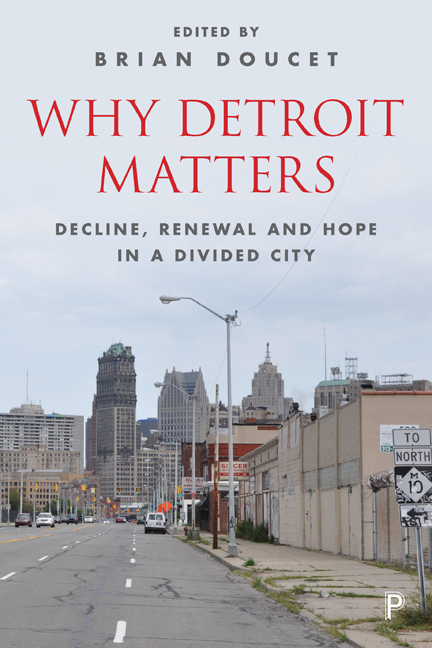Book contents
- Frontmatter
- Contents
- List of contributors
- List of figures and tables
- Acknowledgments
- one Introduction: why Detroit matters
- Section One Lessons from Detroit
- Intermezzo I You may not know my Detroit
- Section Two Practices from Detroit
- Intermezzo II My Detroit
- Section Three Conversations from Detroit
- References
- Index
five - A new urban medicine show: on the limits of blight remediation
Published online by Cambridge University Press: 05 April 2022
- Frontmatter
- Contents
- List of contributors
- List of figures and tables
- Acknowledgments
- one Introduction: why Detroit matters
- Section One Lessons from Detroit
- Intermezzo I You may not know my Detroit
- Section Two Practices from Detroit
- Intermezzo II My Detroit
- Section Three Conversations from Detroit
- References
- Index
Summary
In this chapter, Joshua Akers examines the contemporary practice of blight removal, which he situates in a long line of policies that employ demolition and displacement in urban space. Akers focuses specifically on the role of the private sector in both the production of blight and in blight remediation. Central to his work is the idea that blight is an active, rather than a passive, process and that the emphasis on the removal of blight ignores the actors, policies, and structures that produce blighted and abandoned structures in the first place. As with René Kreichauf's chapter, Akers’ work is rooted in a structural, political-economy perspective. He also argues that interventions in blight removal ultimately work toward further inequalities in Detroit and do not contribute to long-term improvements for the city's poorest and most marginal groups (who are often the ones living next door to blight).
Empirically, Akers focuses on the way in which mortgage and tax foreclosures are part of the active production of blight. He specifically examines the role of speculation and a handful of property speculators in the tax-foreclosure auction process, developing four typologies of speculation on Detroit's foreclosed properties. He questions official reports that tens of thousands of solid homes and buildings somehow “morphed” into ugly blight, and articulates the counter-narrative that blight is rooted in how social relations (economic, racial, political) manifest themselves in property and the built environment. Enacting the analogy of an American medicine show, Akers argues that blight removal treats the symptoms, rather than addressing its root causes.
Joshua Akers is an Assistant Professor of Geography and Urban and Regional Studies at the University of Michigan-Dearborn. His work is focused on the market-based production of decline and crisis dependency in neoliberalism. Recent work has focused on responses to crisis in Detroit and New Orleans.
Introduction
Blight is cancer. Blight sucks the soul out of anyone who gets near it, let alone those who are unfortunate enough to live with it all around them. (Detroit Blight Removal Task Force, 2014, intro)
US cities are again plagued with metaphorical disease. After absorbing mass housing foreclosures, weathering an economic crisis, and withering under urban austerity, a broad coalition of policymakers, foundations, and financiers have dusted off an old urban playbook, cribbing notes on how to remake the inner city through demolition.
- Type
- Chapter
- Information
- Why Detroit MattersDecline, Renewal and Hope in a Divided City, pp. 95 - 116Publisher: Bristol University PressPrint publication year: 2017



